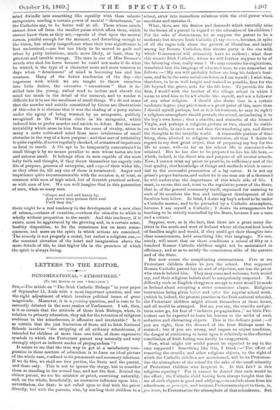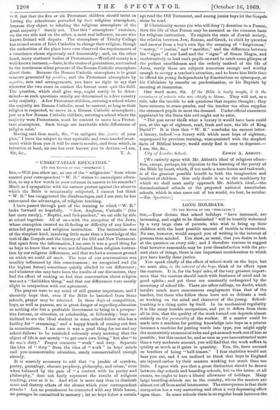LETTERS TO THE EDITOR.
DENOMINATIONAL "ATMOSPHERE."
[TO THE EDITOR OF THE SPECTITOR.1 Sia,—The article on "The Irish Catholic Bishops" in your paper of September 11, deals with a most important question, and one the right adjustment of which involves political issues of great magnitude. Moreover, it is a pressing question, and is sure to be earnestly debated in the next session of Parliament. I ask, then, is it so certain that the attitude of these Irish Bishops, when, in relation to primary education, they ask for the retention of religious emblems in the schoolrooms, is offensive and intolerable? Is it so certain that the just limitation of State aid to Irish National Schools involves "the stripping of all ordinary schoolrooms, if intended for children of more than one faith, of those expressive symbols to which the Protestant parent may naturally and very strongly object as indirect modes of propagandism " ? It seems to me that the true way to get at a satisfactory com- promise in these matters of education is to form an ideal picture of the whole ease, confined to its permanent and necessary relations. If we do this, we shall see two parties, the State and the parent, and these only. This is not to ignore the clergy, but to consider them as standing in the second line, and not the first. Behind the citizen parent, we see his minister or priest, exercising naturally, and, on the whole, beneficially, an enormous influence upon him ; nevertheless, the State is not called upon to deal with the priest -directly, but with the parents, who, by sending their children to a
school, enter into immediate relations with the civil power which sanctions and sustains it.
What, then, are the desires and demands which naturally arise in the breast of a parent in regard to the education of his children? For the sake of distinctness, let us suppose the parent to be a moderate but sincere Irish Catholic (I say sincere, because, in spite of all the vague talk about the growth of liberalism and laxity among lay Roman Catholics, this sincere party is the one with which Government will ultimately have to reckon) ; what does this sincere Irish Catholic, whom we will further suppose to be of the labouring class, really want ? We may conceive his cogitations, translated into the language of educated men, to run somewhat as follows :' My son will probably follow ere long his father's busi- ness, and be in the same social condition as I am myself ; I wish him, therefore, to be as well taught and trained as possible, first for the life beyond the grave, next for the life here. To provide for the first, I would wish the teacher of the village school to which I mean to send him to be a Catholic like myself, and not a follower of any other religion. I should also desire that in a certain moderate degree, (my priest makes a great point of this, more than I should myself perhaps, but as it is his business, he may be right) a religious atmosphere should pervade the school, assimilating it to the boy's own home ; that a crucifix, and statuette of the blessed Virgin, and perhaps a religious picture or two, should be visible on the walls, to catch now and then the wandering eye, and direct the thoughts to the invisible world. A reasonable portion of time being, then, allotted to religious instruction, all that I desire in regard to my first great object, that of preparing my boy for the life to come, will—so far as his school life is concerned—be attained. But he has also to be prepared to live his life here,— which, indeed, is the direct aim and purpose of all secular schools. Now, I cannot trust my priest to provide, in sufficiency and of the best quality, that knowledge of things and methods which is essen- tial to the successful prosecution of a lay career. It is not my priest's proper business, and unless he is one man out of a thousand he will undervalue the importance of this whole side of life. I must, to secure this end, trust to the regulative power of the State, that is, of the general community itself, organized for ensuring to each of its members the free and intelligent development of his faculties here below. In brief, I desire my boy's school to be under a Catholic master, and to be pervaded by a Catholic atmosphere, because I am myself a Catholic ; I desire its arrangements for teaching to be strictly controlled by the State, because I am a man and a citizen.'
Suppose, now, as is the fact, that there are a great many dis- tricts in the south and west of Ireland where all the resident heads of families might and would, if they could get their thoughts into clear consciousness, hold something like this language. No one, surely, will assert that on these conditions a school of fifty or a hundred Roman Catholic children might not be maintained in efficiency, and so as to satisfy the consciences alike of the parents and of the State.
But now comes the complicating circumstance. Five or six Protestant children desire to join the school. Our supposed Roman Catholic parent has no sort of objection, nor has the priest who stands behind him. They may come and welcome, both would say, and their religious beliefs shall be scrupulously respected. No difficulty such as English clergymen are apt to raise would be made in Ireland about accepting a strict conscience clause. Religious instruction being given before and after the regular school work, (which is, indeed, the present practice in the Irish national schools), the Protestant children might absent themselves at those hours, and all would be arranged. But no, you say, the crucifix and pic- tures must go, for fear of "indirect propagandism ;" no little Pro- testant can be expected to learn his lessons in the midst of such seductive and distracting objects. This is the delicate point ; —if you are right, then the demand of the Irish Bishops must be resisted ; but if you are wrong, and impose an unjust condition, the danger of continuing to insist upon it relatively to the effectual conciliation of Irish feeling can hardly be exaggerated.
Now, what might our model parent be expected to say in the case supposed ? Something like this, I think :—' The effect of removing the crucifix and other religious objects, to the sight of which the Catholic children are accustomed, will be to Protestan- tize the atmosphere of the school for the sake of the small minority of Protestant children who frequent it. Is this fair ? is this religious equality ? For it cannot be denied that such would be the effect ; the Catholic child having been always taught that the use of such objects is good and edifying,—to exclude them from his schoolroom on principle, and because Protestants object to them, is, pro tanto, to Protestantize the atmosphere of that schoolroom. But
is it just that the five or six Protestant children should insist on having the schoolroom pervaded by their religious atmosphere, because they object to inhaling the religious atmosphere of the great majority ? Surely not. That this " atmosphere " exercises, on the one side and on the other, a most real influence, no one who knows Ireland will dispute. The atmosphere of Trinity College has caused scores of Irish Catholics tq change their religion, though the authorities of the place have ever observed the requirements of a conscience clause rigorously and honourably ; and, on the other hand, many scattered bodies of Protestants,—Wexford county is a well-known instance, —h ave, in the course of generations, succumbed to the continuous silent pressure of the Roman Catholic atmosphere about them. Because the Roman Catholic atmosphere is in great measure generated by positive, and the Protestant atmosphere by negative, acts and arrangements, you have no right to say that wherever the two come in contact the former must quit the field. The question, which shall give way, ought surely to be deter- mined—as such questions usually are determined in a free country —by majority. A few Protestant children, entering a school where the majority are Roman Catholic, must be content, so long as their religion is respected, to move in a Roman Catholic atmosphere ; just as a few Roman Catholic children, entering a school where the majority were Protestants, must be content to move in a Protes- tant atmosphere. Such things are inevitable while differences of religion exist.'
Having said thus much, Sir, " to mitigate the justice of your plea," I leave the subject to that equitable and even-handed treat- ment which from you it will be sure to receive, and from which, in intention at least, no one has ever known you to deviate.—I am,































 Previous page
Previous page